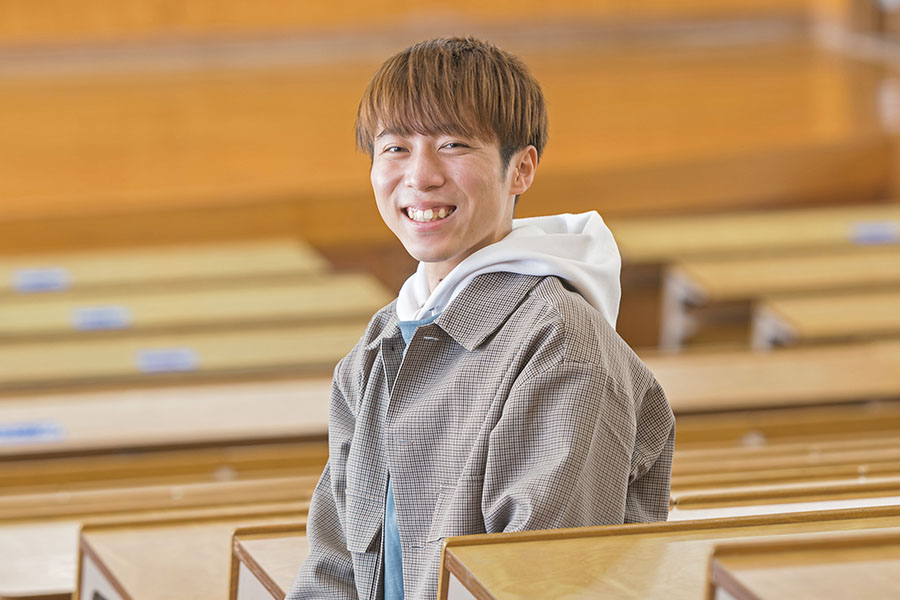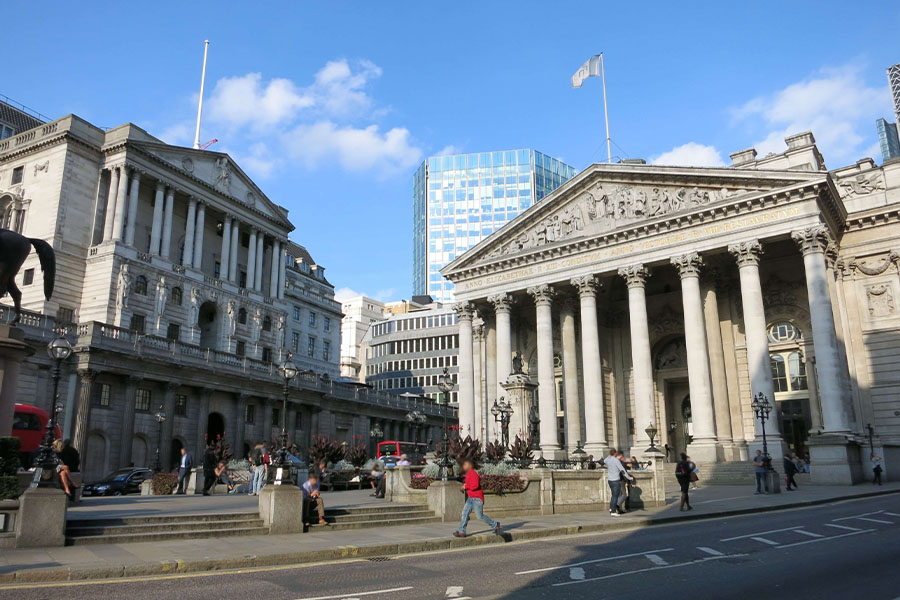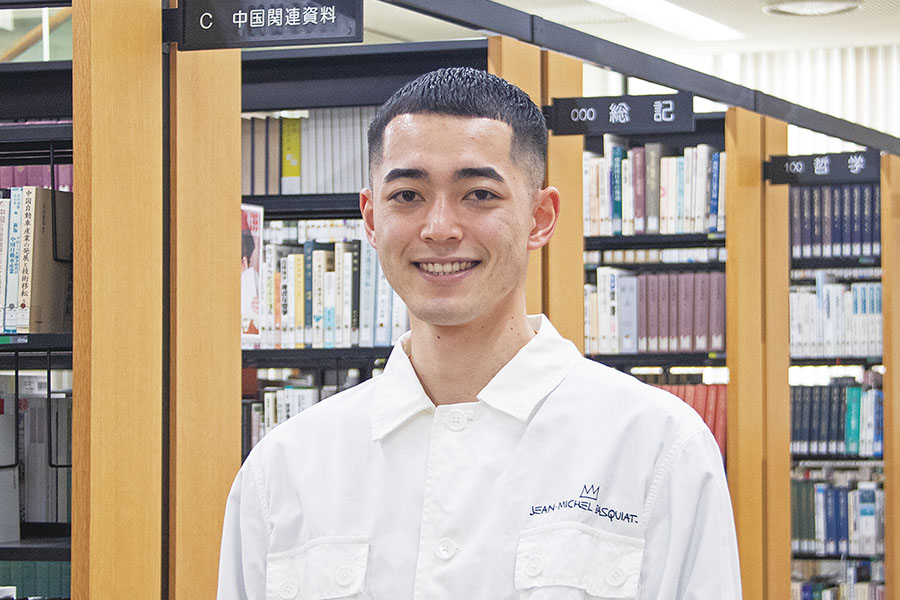- Home
- Faculty, department, and graduate school
- Faculty of Economics
- Department of Economics
Faculty of Economics
Department of Economics

Learning in Department of Economics
Studying various methods of economics and working to solve social problems
Economics is a very wide range of studies. To put it in a nutshell, it is "learning that considers what to do to improve society." In order to think about what to do, it is necessary to understand the structure of society, understand the problems that the real society has, and consider ways to solve it.
Modern society is becoming more complex, such as globalization, computerization, and advanced technology. In response, new research methods are needed in economics, such as analysis of large amounts of statistical data and incorporating human behavioral principles into theories.
At the same time, Department of Economics learns a wide range of economics, from traditional theory to the latest analytical method, and also engages in empirical research and analysis with a wide range of scales from global economies to local communities. By actually touching on the issues facing society, you will deepen your understanding of systems and policies, and learn practical methods for solving problems.
Diplomatic policy for Graduation Accreditation and Graduation Div.
- A.
- He understands typical approaches of economics and acquires the ability to think about economy and society from a broad perspective.
- B.
- While utilizing quantitative and statistical data and models, he has the ability to think logically consider various economic phenomena.
- C.
- He has the ability to consider the actions and relationships of economic entities, such as companies and finance that transcend national borders, while keeping in mind the relationship with the Japanese economy.
- D.
- He has the ability to understand the intentions of various policies and systems related to the economy, society, and region, along with their historical background, and to consider the strengths and weaknesses.

VOICE for current students
Department of Economics 3rd year (as of April 1, 2023)
Yuki Sawada (born from Kobe Seijo High School)
I decided to go on to school because I thought that learning at Shimonoseki City University, where I could gain knowledge of the local economy and society in addition to economics such as finance and Japanese economic conditions, could be used for the work of local government employees, a dream for the future.
The lecture that is particularly impressive is "regional theory", which examines how to maintain the local community in a society with a declining birthrate and aging society. The content of the town I heard in this lecture about the decline of the town is very heavy for myself who wants to revitalize the local area someday due to aging and overlaps with the depopulated local present, and it overlaps with the depopulated local present, and it is very heavy for myself who wants to revitalize the local area someday I stinged heavy. Because of the Department of Economics, we learn about the region and work hard to have a diversified perspective so that we can develop policies and towns that match the region in the future.
In addition, Shimonoseki City University has a support system for each person, as it is easy to ask questions to teachers, so a support system for each person is in place. There are also Career Center Division and counseling rooms, where you can learn in a fulfilling environment for each future.
Curriculum policy for organizing and implementing curriculum policy
- A.
- Understand the major approach of economics through the basics of majors.
- B.
- Deepen the ability to think logically about economic phenomena through major application "theoretical and analytical technique".
- C.
- Through major application "International and East Asia", deepen the ability to consider actions and relationships of economic entities that transcend borders.
- D.
- Deepen the ability to consider policies and systems related to economy, society, and regions through major applications “systems / policies” and “region”.
Introduction of class subjects

Microeconomics
Microeconomics is a study that thinks about our happiness in a world where people make things, interacts with others, and uses and enjoys. In order for us to feel happy when we consumed and happy. In other words, all processes of production, exchange, and consumption must be considered. In this lecture, you will understand the tendency of behavior when people put their own happiness first, and learn that they can explain the changes in prices and transaction volume of various things with the same principle.

Western economic history
The U.S. environmental historian J.R. McNeill said, "The fault of a person who doesn't want to know the past is that we don't know the present age." In Western economic history, we will examine how Western countries have created capitalism, and how capitalism has influenced society and people's lives. As a result, I hope that the understanding of modern socio-economics will deepen. Using images and pictorial materials, we conduct classes on history that are different from memorization.

Town development theory
Japan is changing to a declining birthrate and aging society due to population decline, and a global society with the development of SNS. No one has ever experienced any problems or issues that arise here. That is why it is essential that the industry, the public and private sectors that make up the region work together and work to resolve it. As a basis for thinking about this, we will scientifically study town development and listen directly to people who are active in the field through classes. From there, learn the difference between theory and reality and foster young people who will lead the next generation.
Specialized Education Curriculum
| 1 year | 2 years | 3 years | 4 years | ||
|---|---|---|---|---|---|
| Exclusively Offensive Base Foundation |
Introduction to Economics Economic Mathematics Japanese economy Microeconomics I Macroeconomics I Economic fundamentals I Introduction to International Economics |
Micro Economics II Macroeconomics II Economic fundamentals II Economic Statistics Financial Theory I Finances I Economic Geological I Economic History of Japan Western economic history International Economics Industrial Organizational Theory I |
|||
| Exclusively Offensive Oh, Use |
Doctrine Theory ・ Minutes Precipitation Hand Law |
Measurement Economics I History of Economics Corporate Analysis Theory |
Measurement Economics II Applied microeconomics Industrial Organization Studies II Applied Measurement Economic Analysis Applied macroeconomics Social research theory |
||
| Country Time ・ East A. Di A. |
International Trade Theory Development Economics |
International Macroeconomics International Politics International Relations East Asian Economic Theory China's economic theory Contemporary Korean Socialism International Financial Theory Multinational enterprise theory Economic History of Asia Chinese socialism Korean economic theory |
|||
| System Degree ・ Politics Measures |
Economic Policy I and II Financial Theory II Finance Studies II Social Policy Public Economics Educational Economics |
Modern capitalism theory Securities Recognition Labor Economics Theory Social Security Theory Environmental Economics Non-profit organization theory Administrative studies Financial System Theory Insurance theory Medical Economics Theory Welfare management theory |
|||
| Ground Geographic area |
Regional theory Economic Geological II Town development theory Sociology |
Regional Policy I and II Local finance theory Small and medium-sized enterprise theory Fisheries Economic Theory City planning theory Urban sociology Geographicalism Regional Industrial Theory Urban Environment Theory Local self-government theory |
|||
| Specialized exercise | Specialized Exercise I | Specialized Exercise II | |||
※The curriculum is subject to change.

Graduation PICK UP
Graduated from Department of Economics 2022
Mr. Shironami Yokoyama (from Katsuyama High School, Okayama Prefecture)
Received the Red Horse Award
Policy decision-making process analysis of 1984 Health Insurance Law
―Focusing on the transformation of relationships between the LDP, the Ministry of Health and Welfare and the Japan Medical Association―
I wanted to find a job in the medical industry, so I decided to study medical policy. Looking at the history of medical policies that change with the aging of the population and the economic situation, I learned that the 1984 revision of the Health Insurance Law was a major turning point. Since the achievement of universal health insurance, it has been customary to take several years to revise the Health Insurance Law, and the 1984 revision was passed within the National Assembly. As I follow that historical facts, I became interested in politics and wanted to give my own answer as I followed that historical facts, how politicians and bureaucrats at the time led to the revision under deficit finance. Was. Therefore, while touching on many theories, including the new system theory, we conducted a policy-making process analysis on "why the revision was realized" and tracked the process independently, regardless of the perspective of the preceding research. did.
I have made many successs and failures through job hunting, seminar activities, and writing graduation, but I realized that these days, which I always stopped thinking, grew myself and led me to my future self. I am.






